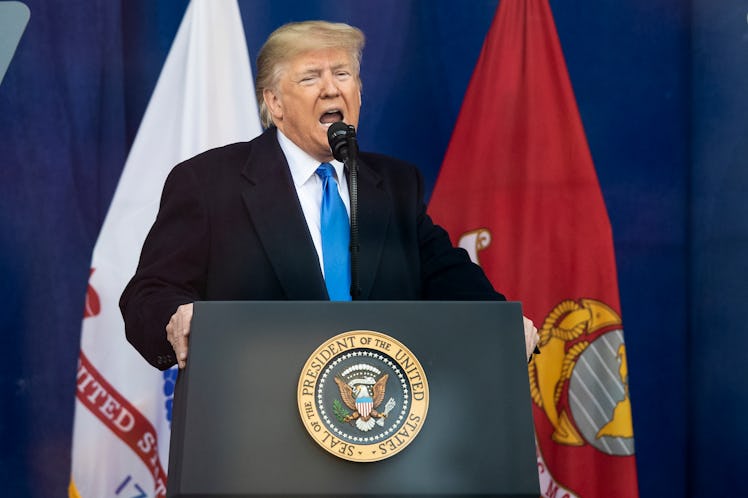
Here's What To Know About What's Happening In Iran
International relations are always complicated, but President Donald Trump's most recent move in Iran is extra troubling. On Thursday, Jan. 2, the Pentagon confirmed Iranian General Qassem Soleimani had been killed in a drone strike ordered by American President Donald Trump, prompting many people who follow international affairs to start worrying about the prospect of an escalating conflict in the Middle East — again. So what's actually happening in Iran? Here's why the strike that killed Soleimani is a big deal.
Soleimani was the head of the Iran's Islamic Revolutionary Guard Corps' (IRGC's) Quds Force, and Al Jazeera reported he was killed in Baghdad, Iraq, this week during an American air strike at Baghdad's international airport. The Quds Force is a branch of the IRGC specifically responsible for military operations outside Iran, such as fighting ISIS and spreading Iranian influence throughout the Middle East. According to TIME, Soleimani and the Quds Force were the first to supply arms to the Kurdish forces fighting ISIS, beating the U.S. to the punch and prompting praise from Kurdish leadership. However, Soleimani was also a controversial figure in the region, and his critics accused him of genocidal action due to his role in propping up Syrian President Bashar al-Assad's regime during the Syrian civil war. He was also accused of terrorism by the United States.
The Trump-ordered drone strike that killed Soleimani came after a series of attacks on American interests in the region, including one that reportedly killed an American contractor on Dec. 27. According to The New York Times, pro-Iranian militia members laid siege to the American embassy in Baghdad on Tuesday, Dec. 31, and the diplomats in the embassy were trapped inside for more than 24 hours. In a statement on Jan. 3, the Pentagon alleged that Soleimani and the Quds Force were behind many of the attacks, and claimed Soleimani had been planning "imminent" attacks that would have endangered the lives of more American citizens. "[Soleimani] was actively plotting in the region to take actions — a big action, as he described it — that would have put dozens if not hundreds of American lives at risk," Secretary of State Mike Pompeo said. Citing unnamed senior American defense officials, NBC News subsequently reported Soleimani had allegedly planned attacks on U.S. targets in Lebanon and Syria.
However, the move to assassinate an Iranian official is likely to have overwhelming diplomatic — and even military — impact. While the United States designated Soleimani and the Quds Force as terrorist entities, Soleimani was popular in Iran, and his death was met with swift outrage in his own country. Iran's supreme leader, Ayatollah Ali Khamenei, promised "harsh revenge" against the United States, and has asked his country to go into three days of national mourning. After the news of Soleimani's death spread around the world, one Iraqi general suggested "some will celebrate, some will mourn, some will seek revenge,” per The Daily Beast.
The move also escalates existing tensions between the United States and Iran, including over Iran's nuclear ambitions. In May 2018, Trump announced he was withdrawing the United States from the Iran nuclear deal, which was orchestrated by his predecessor, President Barack Obama, as an attempt to prevent Iran from achieving nuclear weapons. Iran, France, Germany, and Britain all recommitted to the deal despite Trump's withdrawal, per The New York Times, seeking a policy of deescalation. As of January 2020, Iran does not have a nuclear weapons program, although it may have the capability to pursue one.
On Friday, Jan. 3, Trump addressed Soleimani's killing from his Palm Beach estate. According to the Associated Press, Trump argued Soleimani “made the death of innocent people his sick passion." He added, “We take comfort in knowing that his reign of terror is over."
Soleimani's death was met with large protests in Iran, according to The New York Times, and mixed reactions around the world. In the United States, many expressed concern the killing could lead to war or other violent conflict between the United States and Iran. Many on social media compared the rising conflict to the post-9/11 invasion of Iraq, and warned of the possibility of destabilization or other violence in the region.
2020 Democratic presidential candidates Elizabeth Warren and Bernie Sanders warned Soleimani's death could have unintended consequences. “As we all remember, Trump promised to end endless wars," Sanders said in an Iowa campaign event on Friday. "Tragically, his actions now put us on the path to another war, potentially one that could be even worse than before."
Warren shared Sanders' concern. "This reckless move escalates the situation with Iran and increases the likelihood of more deaths and new Middle East conflict," Warren tweeted. "Our priority must be to avoid another costly war.” In his remarks about Soleimani's death, Trump said that his administration had taken action to "stop a war," not to start one. The Trump 2020 campaign did not immediately respond to Elite Daily's request for additional comment on Sanders' and Warren's remarks. Other members of Congress criticized Trump's move as amounting to an illegal act of war. Under the Constitution, Congress has the power to declare war.
As of Jan. 3, American defense officials have decided to send 3,000 more Army troops to the Middle East in order to protect U.S. interests in the region, per NBC. The United States has also advised its citizens to "immediately" leave Iraq in case there is an escalation in tensions.